Why do migrants cross the English Channel? Reasons people come to UK from France - as Rwanda plan announced
and live on Freeview channel 276
The UK has announced plans to send asylum seekers attempting to cross the English Channel by boat 4,000 miles away to Rwanda for processing.
Boris Johnson announced the move this week to widespread criticism from refugee and human rights groups - although snap polling by YouGov suggests there is some support for the measure, particularly among older Conservative Party voters.
Advertisement
Hide AdAdvertisement
Hide AdMore than 1,000 boat crossings carrying 28,500 people were attempted in the English Channel in 2021 - a 61% spike on the previous year.
There are concerns good weather conditions over the Easter bank holiday could prompt more people to make the perilous journey.
But why are these people trying to reach the UK?
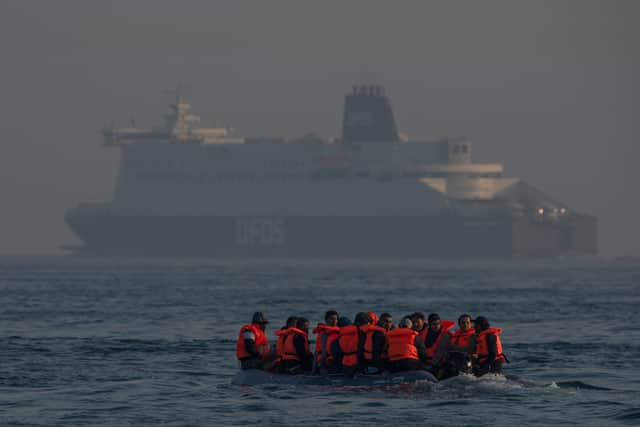

Who are migrants?
The term ‘migrant’ is an umbrella term for a person who has moved from one country to another.
Meanwhile, an ‘immigrant’ is someone who comes to live permanently in a foreign country.
Advertisement
Hide AdAdvertisement
Hide AdThese two terms encompass groups of people who are leaving their country of origin for particular reasons.
One of these groups is asylum seekers.
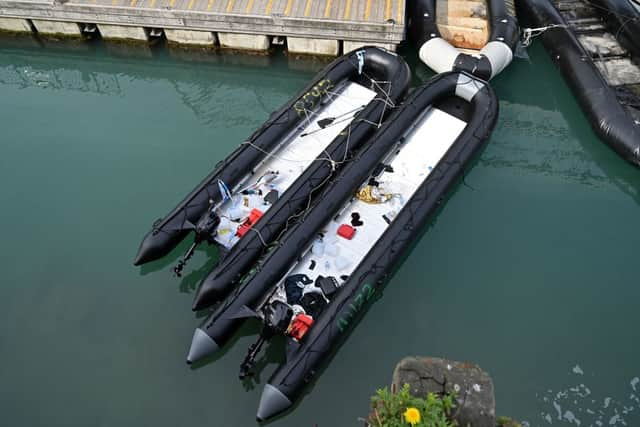

These are people who are seeking international protection but whose claim has not yet been finally decided on by the country they want to enter.
Not all asylum seekers ultimately get recognised as refugees, but every refugee was initially an asylum seeker.
A refugee is a person who has fled their country of origin due to a “well-founded fear of persecution for reasons of race, religion, nationality, membership of a particular social group or political opinion,” according to international law.
There are also other reasons for migration.
Advertisement
Hide AdAdvertisement
Hide AdFor example, a migrant might be moving for economic reasons, as a result of climate change or because of a natural disaster.
How many migrants come to the UK?
Out of the UK’s population - which sits at roughly 67 million people - Office for National Statistics data states the UK’s net migration was 313,000 people in the year to March 2020 (the latest figures available).
Net migration is how many more/fewer people there are in a country as a result of immigration and emigration.
The 313,000 figure is lower than the previous peak level of 331,000 - recorded in the year to March 2015 - but a slight rise on 2019.
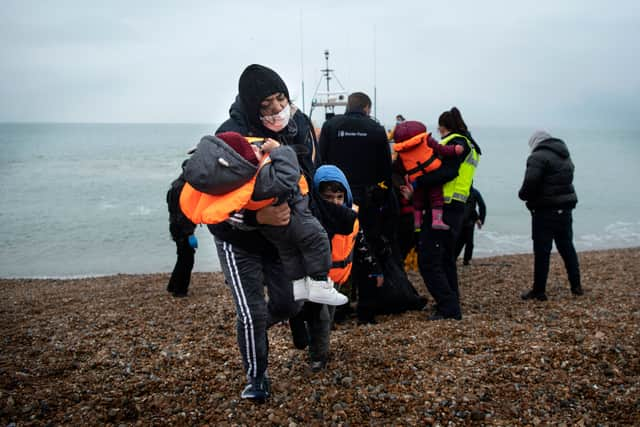

Advertisement
Hide AdAdvertisement
Hide AdThere were 37,235 applications from asylum seekers in the 12 months to June 2021, a drop of 4% on the previous year.
There are no official figures for the number of people who have migrated to the UK illegally.
But the National Audit Office (NAO) estimates there could be between 600,000 and 1.2 million people who have done so.
Meanwhile, official figures for the number of people who attempted to get to the UK by boat were more than 28,500 in 2021.
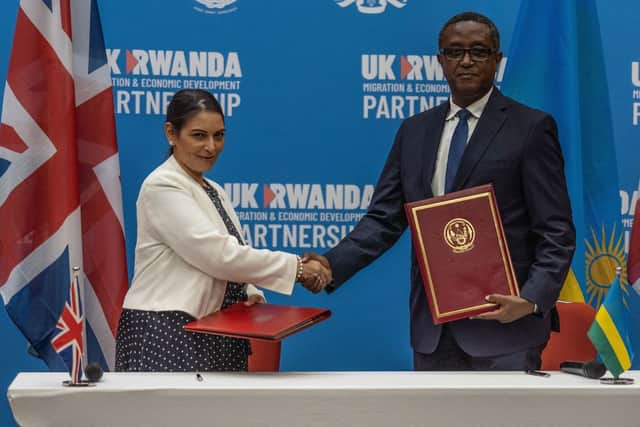

Advertisement
Hide AdAdvertisement
Hide AdThis is a steep rise on 2020, when 8,420 people tried to come across, and 2019 when 1,800 migrants attempted the crossing.
It has largely been driven by the Covid-19 pandemic cutting the number of legal routes into the UK and Brexit disrupting illegal ones, for example freight between the UK and France has dropped.
Overall, non-partisan fact-checking organisation Full Fact has found that there “isn’t much direct evidence” to suggest the UK is disproportionately favoured by asylum seekers.
Indeed, Germany has been the biggest destination in Europe for refugees.
Why do migrants want to come to the UK?
Advertisement
Hide AdAdvertisement
Hide AdThere are a number of factors why people are willing to risk their lives to come to the UK.
The main reason is that these people have family ties to the UK, but other reasons include the UK’s asylum system, the English language, safety, and economic opportunity.
- Family ties
The UK is a multicultural country that has played a key role in global politics for centuries.
Close political, economic and cultural ties with countries around the world have led many people to settle here.
Advertisement
Hide AdAdvertisement
Hide AdFor example, there are a large number of British people with Indian and Pakistani heritage due to the countries’ close connection to the British Empire.
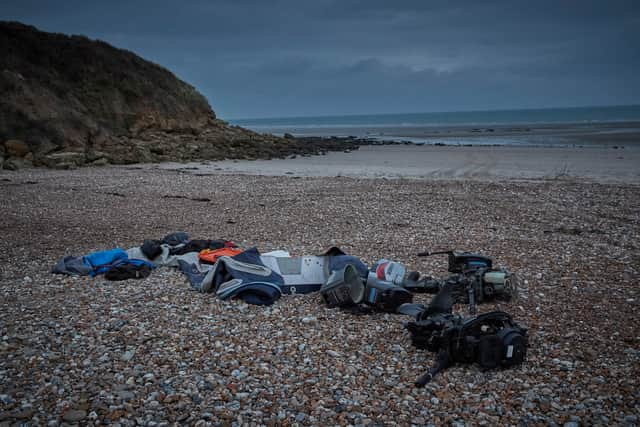

In more recent years, the UK has become home to people who have been impacted by wars the country has been involved in, such as the conflicts in Afghanistan and Iraq.
And the fact that the UK has been one of the largest economies in the world since the Industrial Revolution has led people from many other countries to come here in search of economic opportunity.
So it is unsurprising that some of those seeking to cross the Channel are doing so in a bid to be with family members who have already settled in the UK.
Advertisement
Hide AdAdvertisement
Hide AdThe right to a family is classified as a human right under the Universal Declaration of Human Rights.
- The UK’s asylum system
Generally, the UK only accepts asylum claims from people who are already on British soil.
Given air traffic is well down on pre-Covid levels and less freight is moving between the UK and France, there are currently fewer routes into the UK for potential refugees.
So the people camped in France who are hoping to reach the UK currently have little other option but to attempt a bo
- The English language
Advertisement
Hide AdAdvertisement
Hide AdThanks to the dominance of the British Empire and the USA on the global stage over recent centuries, English is the world’s most widely spoken language.
According to Statista data from March 2021, 1.35 billion people speak English - either as a native tongue or as a second language.
The next most spoken language is Mandarin, with 1.12 billion speakers.
Meanwhile, there are 267 million speakers of French.
Being able to speak the language of a country you wish to reside in can provide a greater chance of securing a job and integrating into a society, hence why some people are keen to reach the UK.
- Safety
Advertisement
Hide AdAdvertisement
Hide AdThe UK has a global image of being a safe and tolerant democratic society.
Given the home countries of refugees tend to be war-torn or undergoing political upheaval, it is no surprise that many of them have looked at the UK as a place of sanctuary.
According to the UN Refugee Agency (UNHCR), in June 2021 68% of the world’s refugees came from just five countries - Syria (6.7m people), Venezuela (4m), Afghanistan (2.6m), South Sudan (2.2m) and Myanmar (1.1m).
73% of these people, and all the other refugees in the world, were hosted in neighbouring countries.
Advertisement
Hide AdAdvertisement
Hide AdIn the case of Syria, these include Turkey (which hosts the largest number of refugees in the world at 3.7 million people), Jordan and Lebanon.
None of these countries can be said to be especially safe or free.
Turkey is under the leadership of an authoritarian ruler - President Recep Tayyip Erdoğan, Lebanon is in the depths of a major economic crisis and, while Jordan is relatively stable, it has a poor human rights record, according to Amnesty International.
Meanwhile, according to expert in migration policy at the French Institute of International Relations (IFRI) Matthew Tardis, people who have made it to Europe often pass through most of the continent’s countries due to hostile environments.
Advertisement
Hide AdAdvertisement
Hide Ad"The bad conditions [migrants] experience in France, in Italy, in other EU countries, pushes them to go even further, to think that in the UK it will be better,” he said.
- Economic opportunity
The UK is one of the world’s biggest economies.
And it is also one of the least-regulated in western Europe, making it easier for migrants to find informal or blackmarket work once they get here.
“The economy is far less regulated than in France, there are more opportunities,” Tardis said.
“It’s a very liberal economy that needs labour that isn’t that well paid, and foreigners typically accept these types of positions."
Advertisement
Hide AdAdvertisement
Hide AdDespite the common refrain that migrants are only interested in the UK’s benefits system, analysis by The Times newspaper has shown this to be not the case.
The £39.63 weekly allowance available in the UK is less generous for asylum seekers than in France, where they are given £43.50 per week and can start applying for work after six months.
A message from the editor:
Thank you for reading. NationalWorld is a new national news brand, produced by a team of journalists, editors, video producers and designers who live and work across the UK. Find out more about who’s who in the team, and our editorial values. We want to start a community among our readers, so please follow us on Facebook, Twitter and Instagram, and keep the conversation going. You can also sign up to our email newsletters and get a curated selection of our best reads to your inbox every day.
Comment Guidelines
National World encourages reader discussion on our stories. User feedback, insights and back-and-forth exchanges add a rich layer of context to reporting. Please review our Community Guidelines before commenting.
